It's What's Happening Beneath the Surface That Matters: Moral Decay and Rising Inequality
March 6, 2017
These disintegrative forces are easy to see but elusive to pin down. Nobody defines themselves as self-serving, greedy and lacking in virtue. Everyone feels trapped in the system.
With the media's hyperactive three-ring circus blasting 24/7, it's easy to forget that everything consequential is happening beneath the surface, out of sight and largely out of mind.
What's going on beneath the surface is structural and systemic--for example, the 4th Industrial Revolution that is transforming the global economy and social order, regardless of political ideologies or our wishes.
Centralization--the "solution" to every problem since 1940--is now the problem. Centralization generates corruption, privilege, rentier skims, institutionalized rackets and pushes one-size-fits all failure down the chain of command.
Fragmentation and the De-Optimization of Centralization (January 2, 2017)
Another "solution"--issuing more costly credentials--has also failed. An over-abundance of credentials pushes wages down, even for the highly educated, while the credential mill of higher education has become a bloated, ineffective cartel that charges outrageous fees for increasingly valueless credentials.
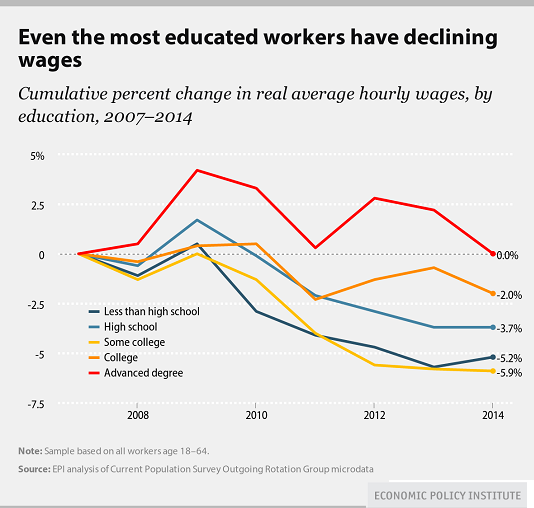
The structural changes in the economy are visible in these charts:
The civilian participation rate is plummeting, despite the "recovery:"
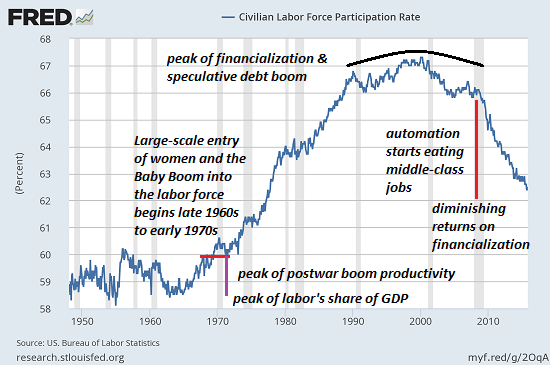
The civilian participation rate for men is in a multi-decade decline:
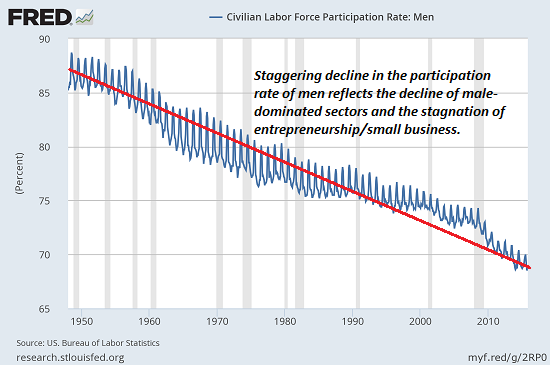
As a percentage of GDP, wages have been declining for decades.
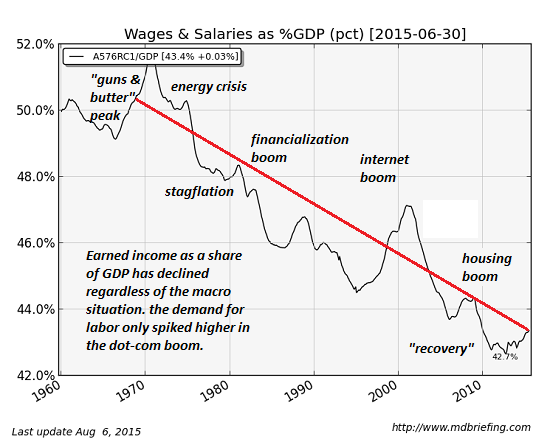
The rich have managed to gain wealth and income while the bottom 95% have gotten poorer as the cost of living soars and their wages stagnate.
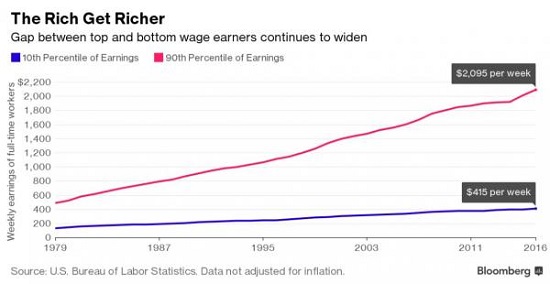
There is more going on here than changes wrought by technology. Consider how many analysts identify central banks as a key cause of rising inequality and debt burdens. Consider how many people identify "money in politics" as a key factor in the corruption of governance. Consider how many people view "big government" as the force eroding civil liberties and imposing financial repression on all but the super-wealthy who influence Big Government with campaign contributions, lobbying, sweetheart contracts, revolving doors between government jobs and lucrative corporate positions, etc.
All of these institutions were present in the "golden era" of the 1950s and 60s. The Federal Reserve and Big Government were dominant forces, and money was the mother's milk of politics. Large corporations flourished and heavily influenced government policies.
So what's changed? Why are our systems of governance and finance now so dominated by the super-wealthy and corporations? Why are they so corrupted and ineffective?
Beneath the surface, the moral dynamics of the social order and the economic mode of production have corroded, generating systemic moral decay and soaring inequality. An awareness of the common good has been completely eclipsed by a single-minded, obsessive devotion to maximizing personal gain by whatever means are available.
Those benefiting from obsolete ideas and systems cling to them obstinately to maintain their slice of the pie, dooming the entire social/ economic /political order to stagnation and collapse.
With the loss of an awareness of the common good, there is no stomach for sacrifice of any kind--we wuz promised and I'm a deserving victim are the cultural norms.
Moral decay at the top quickly infects the entire social-order pyramid. Once injustice is institutionalized in unearned privileges, rentier skims and scams, systemic fraud, state-enforced rackets, a some-are-more-equal-than-others judicial system and a drug-war Gulag for the disenfranchized, the systemic injustices corrupt not just every institution but the culture that is internalized by every participant.
I covered these dynamics in my short book Inequality and the Collapse of Privilege, and historian Peter Turchin has illuminated historic cycles and examples in his book War and Peace and War: The Rise and Fall of Empires, which describes how civic virtue is gradually replaced by personal greed and self-interest.
This excerpt perfectly captures the current zeitgeist:
"Virtus included the ability to distinguish between good and evil and to act in ways that promoted good, and especially the common good. Unlike Greeks, Romans did not stress individual prowess, as exhibited by Homeric heroes or Olympic champions. The ideal of hero was one whose courage, wisdom, and self-sacrifice saved his country in time of peril.
Unlike the selfish elites of the later periods, the aristocracy of the early Republic did not spare its blood or treasure in the service of the common interest. When 50,000 Romans, a staggering one fifth of Romeís total manpower, perished in the battle of Cannae, as mentioned previously, the senate lost almost one third of its membership. This suggests that the senatorial aristocracy was more likely to be killed in wars than the average citizen....
The wealthy classes were also the first to volunteer extra taxes when they were neededÖ A graduated scale was used in which the senators paid the most, followed by the knights, and then other citizens. In addition, officers and centurions (but not common soldiers!) served without pay, saving the state 20 percent of the legionís payroll....
The richest 1 percent of the Romans during the early Republic was only 10 to 20 times as wealthy as an average Roman citizen."
Turchin's latest book, Ages of Discord, describes the cyclical nature of disintegrative and integrative eras. (Needless to say, we're in a disintegrative phase.)
These long cycles parallel the cyclical analysis of David Hackett Fischer, whose masterwork The Great Wave: Price Revolutions and the Rhythm of History I've referenced many times over the years, most recently in We've Entered an Era of Rising Instability and Uncertainty (July 18, 2016).
Corralling the Fed, staunching the flow of money into politics and limiting the predations of Big Government on civil liberties and economic freedoms would be welcome reforms, but they won't be enough. The moral rot has hollowed out not just these institutions of governance and power, but the entire social order and the mode of production.
These disintegrative forces are easy to see but elusive to pin down. Nobody defines themselves as self-serving, greedy and lacking in virtue. Everyone feels trapped in the system as it is, a swirling funhouse of smoke and mirrors in which everyone seeks to maximize their private gain at the expense of others or the system itself, all the while signaling their virtue with cheap, substance-free speech acts.
This precisely mirrors what the Romans were proclaiming as their empire crumbled around them. You can't rebuild a moral center with more regulations and legislation, or by trying to silence critics. Proliferating regulations and attempts to silence critics are simply proof that the disintegration is accelerating down the slide to disorder and collapse.
NOTE: Contributions/subscriptions are acknowledged in the order received. Your name and email remain confidential and will not be given to any other individual, company or agency.
|
Thank you, Tina L.S. ($50), for your monstrously generous contribution to this site -- I am greatly honored by your steadfast support and readership. |
Thank you, Jurrian K. ($5/month), for your outstandingly generous contribution to this site -- I am greatly honored by your support and readership. |

Discover why Iím looking to retire in a SE Asia luxury resort for $1,200/month. |